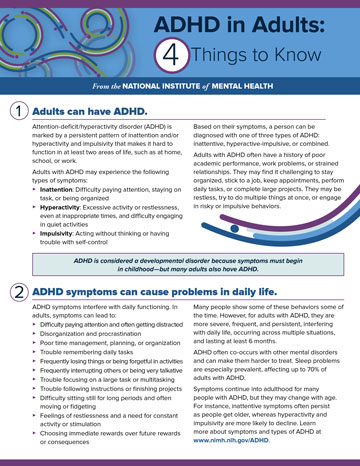
Have you experienced challenges with concentration, impulsivity, restlessness, and organization throughout your life? Have you ever wondered whether you might have attention-deficit/hyperactivity disorder (ADHD)?
Although ADHD is well known as a condition that affects children, many adults also experience it.
1. Adults can have ADHD.
Attention-deficit/hyperactivity disorder (ADHD) is marked by a persistent pattern of inattention and/or hyperactivity and impulsivity that makes it hard to function in at least two areas of life, such as at home, school, or work.
Adults with ADHD may experience the following types of symptoms:
- Inattention: Difficulty paying attention, staying on task, or being organized
- Hyperactivity: Excessive activity or restlessness, even at inappropriate times, and difficulty engaging in quiet activities
- Impulsivity: Acting without thinking or having trouble with self-control
Based on their symptoms, a person can be diagnosed with one of three types of ADHD: inattentive, hyperactive-impulsive, or combined.
Adults with ADHD often have a history of poor academic performance, work problems, or strained relationships. They may find it challenging to stay organized, stick to a job, keep appointments, perform daily tasks, or complete large projects. They may be restless, try to do multiple things at once, or engage in risky or impulsive behaviors.
ADHD is considered a developmental disorder because symptoms must begin in childhood—but many adults also have ADHD.

2. ADHD symptoms can cause problems in daily life.
ADHD symptoms interfere with daily functioning. In adults, symptoms can lead to:
- Difficulty paying attention and often getting distracted
- Disorganization and procrastination
- Poor time management, planning, or organization
- Trouble remembering daily tasks
- Frequently losing things or being forgetful in activities
- Frequently interrupting others or being very talkative
- Trouble focusing on a large task or multitasking
- Trouble following instructions or finishing projects
- Difficulty sitting still for long periods and often moving or fidgeting
- Feelings of restlessness and a need for constant activity or stimulation
- Choosing immediate rewards over future rewards or consequences
Many people show some of these behaviors some of the time. However, for adults with ADHD, they are more severe, frequent, and persistent, interfering with daily life, occurring across multiple situations, and lasting at least 6 months.
There are many reasons someone may not be diagnosed with ADHD until adulthood. For instance, your teachers and parents may not have recognized the disorder or may have provided supportive environments that helped you thrive despite it.
ADHD often co-occurs with other mental disorders and can make them harder to treat. Sleep problems are especially prevalent, affecting up to 70% of adults with ADHD.
Symptoms continue into adulthood for many people with ADHD, but they may change with age. For instance, inattentive symptoms often persist as people get older, whereas hyperactivity and impulsivity are more likely to decline. Learn more about symptoms and types of ADHD.
3. ADHD is diagnosed differently in children and adults.
ADHD can be diagnosed in childhood or adulthood. However, adults must have shown symptoms much earlier, starting before age 12.
The main difference between diagnosing ADHD in children and adults is the number of symptoms. Adults or adolescents over 16 years must show five (instead of six) symptoms of inattention or hyperactivity and impulsivity.

How can a provider know if I showed ADHD symptoms as a child?
Diagnosing ADHD in adulthood is complicated by the need to show symptoms before age 12. For this reason, a diagnosis relies heavily on past reports of behavior.
To help diagnose ADHD, a primary care provider or mental health professional may ask to talk to people who know you well, such as a partner, family members, and friends, to learn about your behavior in different situations and during childhood. They may look at school reports or other childhood records.
A provider will also talk to you and may ask you to do the following:
- Complete clinical interviews, behavior rating scales, or symptom checklists to determine whether you meet the criteria for a diagnosis of ADHD.
- Take psychological tests that look at cognitive processes, such as memory, planning, decision-making, reasoning, and thinking, to identify strengths and challenges and possible learning disabilities.
- Report on your mood and current and past medical conditions to rule out alternative diagnoses and establish an overall treatment plan.
Why wasn’t I diagnosed with ADHD earlier?
There are many reasons someone may not be diagnosed with ADHD until adulthood. For instance, your teachers and parents may not have recognized the disorder or may have provided supportive environments that helped you thrive despite it. Or you may have a milder form of ADHD that could be managed well until faced with the stresses and demands of adulthood, especially at work.
ADHD symptoms among girls and women are especially likely to have been missed in childhood. Sex differences in diagnosis rates begin to even out in adulthood.
It is never too late to seek a diagnosis and treatment for ADHD and any other mental health condition that may occur with it. Effective treatment can make day-to-day life easier for many adults and their families. Find tips for talking with a health care provider.
You can learn more about getting help on the NIMH website. You can also learn about finding support and locating mental health services in your area on the Substance Abuse and Mental Health Services Administration (SAMHSA) website.

Interested in learning more about this topic? Check out this podcast in which CHC experts offer tips for navigating life with ADHD.
4. Treatment is available for adults with ADHD.
Treatment for ADHD can reduce symptoms and improve functioning. The most common treatments for ADHD in adults are:
- Medication, usually stimulant medications
- Psychotherapy, like behavioral and cognitive behavioral therapy
Effective treatment often involves a combination of elements. Sometimes, people must try several treatments before finding the one that works for them.
Learn more about stimulants and other mental health medications. Learn more about psychotherapy.
Some adults may find it helpful to get support from a life coach or ADHD coach who can teach them executive function skills to improve daily functioning. Others try lifestyle changes, like adding more physical exercise to their daily schedule.
People whose ADHD symptoms cause impairment at work may qualify for reasonable accommodations under the Americans with Disabilities Act (ADA) .
What are clinical trials and why are they important?
Clinical trials are research studies that look at ways to prevent, detect, or treat diseases and conditions. These studies help show whether a treatment is safe and effective in people. Some people join clinical trials to help doctors and researchers learn more about a disease and improve health care. Other people, such as those with health conditions, join to try treatments that aren’t widely available.
NIMH supports clinical trials across the United States. Talk to a health care provider about clinical trials and whether one is right for you. Learn more about participating in clinical trials.
Download a PDF of this publication or order a free hardcopy. You can also read or download a Spanish-language version.
Source: National Institute for Mental Health (NIMH) | ADHD in Adults: 4 Things to Know, https://www.nimh.nih.gov/health/publications/adhd-what-you-need-to-know | Public domain. Last revised 2024. Retrieved February 2025.





